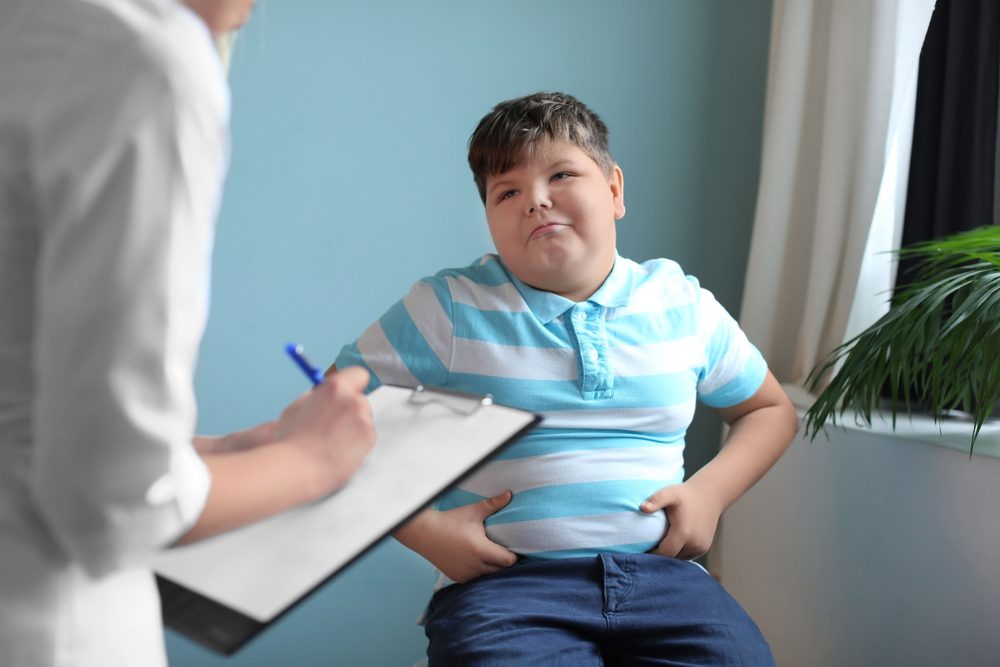Is your child greeted with hugs from everyone because he’s plump and cuddly?
Is his name Moto across the family? Is this something that really bothers you?
If yes, then your child is obese for his age, gender, and height. He clearly consumes far more calories than he expends through physical activity.
As a result, the unused calories are stored as fat in his body, which often settles around his waist and hips.
Childhood obesity is clearly on the rise and spreading like a pandemic. According to the World Health Organization (WHO), there are 43 million children under the age of 5 who are obese.
As you very well know, obesity is the mother of all ailments. Research also shows that obese children are more likely to stay obese in adulthood. It’s very dangerous for your child to be obese at such a young age.
Let’s determine first if your child is obese or not.
Table of Contents
How to Know If Your Child is Obese?
It’s not always easy to discern whether a child is overweight. Children develop at various speeds and at various times.
Calculating your child’s BMI External link is one technique to see if he or she is overweight (BMI). The BMI is a ratio of body weight to height.
The BMI charts use a number called a percentile to show how your child’s BMI compares with the BMI of other children. The main BMI categories for children and teens are:
- Healthy weight: 5th to 84th percentile
- Overweight: 85th to 94th percentile
- Obese: 95th percentile or higher
What Are the Causes of Childhood Obesity?
Portion Sizes
It may seem simple, but portion size has a direct impact on the amount of food ingested in a single sitting.
That means that if the portion in front of you is larger, you’re more likely to consume more than you require.
When you buy your child a “supersize meal”at a fast food restaurant, you assure that you’re saving money and getting more bang for your buck. However, you’re giving your child far more calories than his body requires or can utilize for energy.
School Lunch
Do you allow the food industry to feed your child? If that’s the case, you may find that the lunch options provided to your children at school aren’t precisely what you’d like them to eat.
Yes, schools must meet specific nutritional standards. They are, however, permitted to utilize foods containing artificial flavors and colors, as well as food additives, preservatives, and emulsifiers.
Consumption of Processed Foods
Sugary and processed foods, which are prevalent in many children’s diets, are one of the primary causes of obesity.
Today’s youngsters consume more high-calorie, nutrient-deficient diets and fewer foods rich in vitamins, minerals, and other important micronutrients.
Consumption of sugary and processed snack foods poor in micronutrients have links to the rise in childhood obesity.
Absence of Healthy Fats
Eating a diet high in healthy fats is linked to a lower incidence of obesity. Surprising, right?
Healthy fat consumption shows a negative correlation with metabolic risk factors and obesity.
Foods high in healthy fats, such as avocados, butter, wild-caught salmon, yogurt, and coconut oil, are complex foods that include a variety of essential nutrients.
It is unlike the sweetened or processed diets consumed by so many children today. It’s better to use diet that contains nutrients such as protein, calcium and other minerals such as a high nutritious milk powder.
Lack of Physical Activity
Lack of physical activity including sports, running and jumping etc which children loved to do, is now nowhere in a child’s life.
Children who engage in greater physical activity have lower body fat levels than those who do not.
Instead of running about outside, participating in sports, or engaging in other forms of physical activity, children are opting for more sedentary hobbies that require prolonged sitting.
For example, the prolonged use of mobile phones, playing video games on phones and laptops.
Stress
Obese children encounter psychological concerns such as stress, anxiety, and depression.
Many obese children develop separation anxiety when away from their parents and worry about their weight and eating habits.
Adolescents are agitated and anxious about their weight, so they turn to crash dieting, which causes them to overeat.
These are all serious indicators for your child, and bring out the basic question: ‘how to prevent childhood obesity’?
No worries! Just keep on reading this article for amazing home remedies to get rid of childhood obesity.
Home Remedies to Get Rid of Childhood Obesity
Here is a list of options for your child to get rid of childhood obesity, starting with foods:
Tomatoes and Green Leafy Vegetables
Every day, give your child a salad of tomatoes, dark green leafy vegetables, and carrots, which are high in fiber.
These vegetables will keep him satisfied for a long time, eliminating the need for more food.
This is a first step toward lowering his overall calorie intake.
Honey and Lemon Juice
According to the top reviewed pediatrician in Karachi, Dr. Syed Uzair Maqsood “Combine one teaspoon of honey to lemon juice in a glass of warm water. Mix well and give this liquid to your child every day to drink on an empty stomach.”
Apple Cider Vinegar
Use this home cure for reducing body fat.
A teaspoon of this vinegar mixed with an equal amount of lemon juice in a glass of warm water will help your obese youngster lose weight.
While the apple cider vinegar speeds up metabolism, the water keeps your child hydrated, and the lemon juice enhances the drink’s flavor.
Give this drink to your child on an empty stomach every day for three months to witness the change.
Mint Leaves
Peppermint is a member of the mint family, known for its digestive properties.
Mint helps with weight loss in addition to its digestive function.
For best benefits, make a cup of peppermint tea for your child and give it to him once or twice a day.
Cayenne Pepper
Spicy food contains capsaicin, a chemical that stimulates the body to burn more calories.
Combine cayenne pepper, mustard seeds, ginger, and black pepper in a bowl and use in cooking.
Give your child a small bit of this because he may not be able to tolerate a lot of spicy food at his age.
Warm Water
It’s vital to instill the habit of drinking warm water rather than cold. Your child will lose weight quickly if he starts drinking warm water.
He should drink eight to ten glasses of warm water per day to stay hydrated during the day.
The warm water he drinks will aid in the removal of all excess fat in his body by burning extra calories multiple times throughout the day, resulting in weight loss.
Weight Maintenance Tips to Get Rid of Childhood Obesity
Say No to Convenience Foods
When you’re at the store buying food, don’t choose crackers, prepared meals and cookies that are rich in sugar, calories and fat.
Instead, buy healthy snacks which will help your child in maintaining a normal weight.
Limit Sweetened Drinks
If your child is attempting to lose weight, don’t let him consume fruit juice from a carton. Because these juices are heavily sweetened. They are high in calories and so counterproductive to your child’s weight loss efforts.
Your Child Shouldn’t Be a Couch Potato
The amount of time your child spends in front of the television, playing video games, or using a tablet can diminish his physical activity.
Make your child participate in a series of physical activities that will limit his time in front of the television or mobile phone.
Inculcate Habit of Exercising
Exercise makes children groan, so don’t force your child to do it every day. Instead of doing something structured, let him do something free.
To get him moving as much as possible, let him play in the garden, jump rope, or go cycling–all of which are excellent ways to burn calories.

Introduce Your Child to Healthy Activities
Open your child’s mind to a variety of activities so he can pick the ones he enjoys.
He might enjoy going on a nature trek in search of rocks and leaves, or he might enjoy climbing walls or exploring a jungle gym.
Other activities he might love are biking, walking, and swimming.
Putting it All Together!!
Don’t assume that an obese child will always be fat; there are techniques to get him to lose weight. People will also refrain from making comments about his fat. It’s up to you to get him to drop all of the unhealthy weight. This article covers all bases on how to prevent childhood obesity. You can get a lot of help from here.
If you want to consult a well-known pediatrician, book an appointment via Healthwire.pk or call at (042) 32500989.
